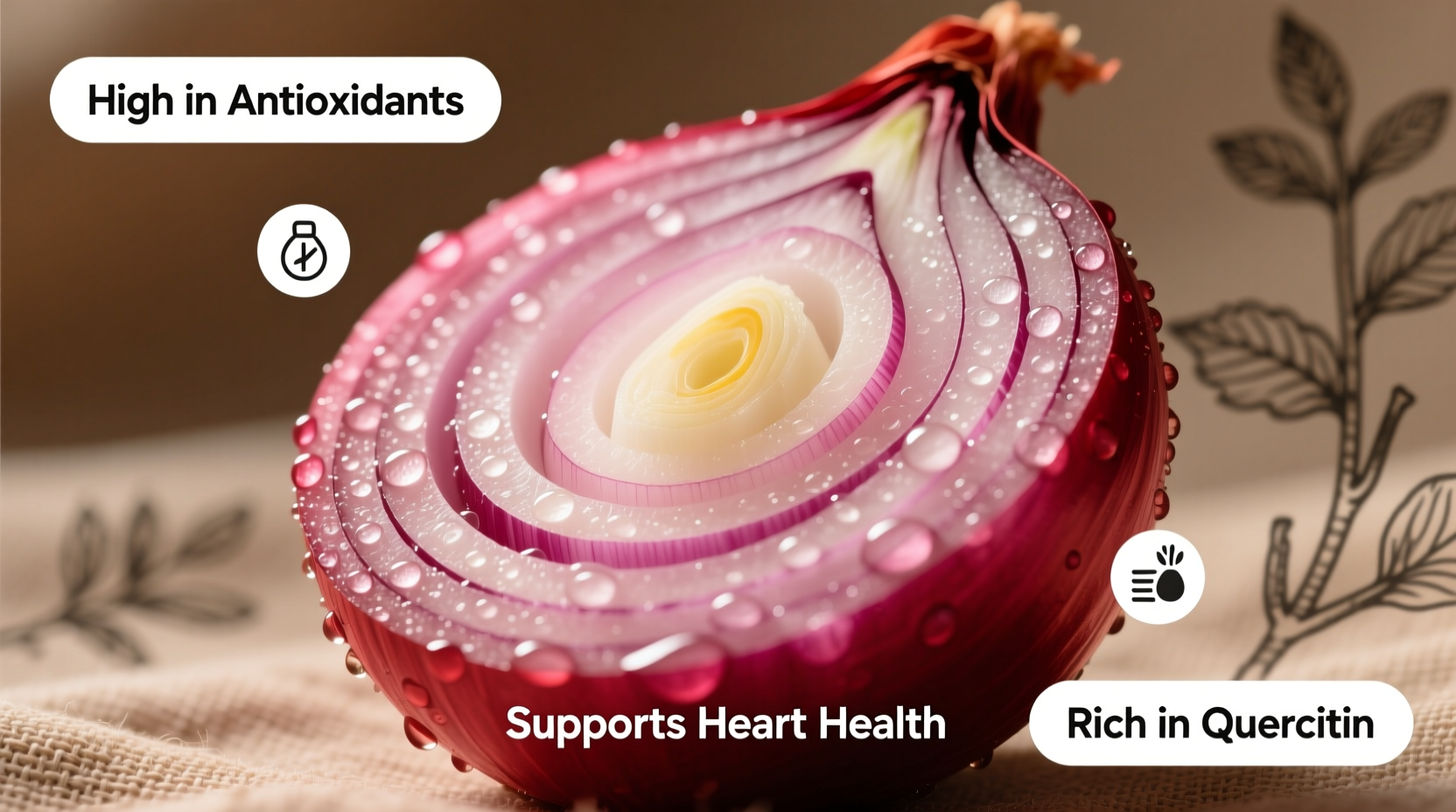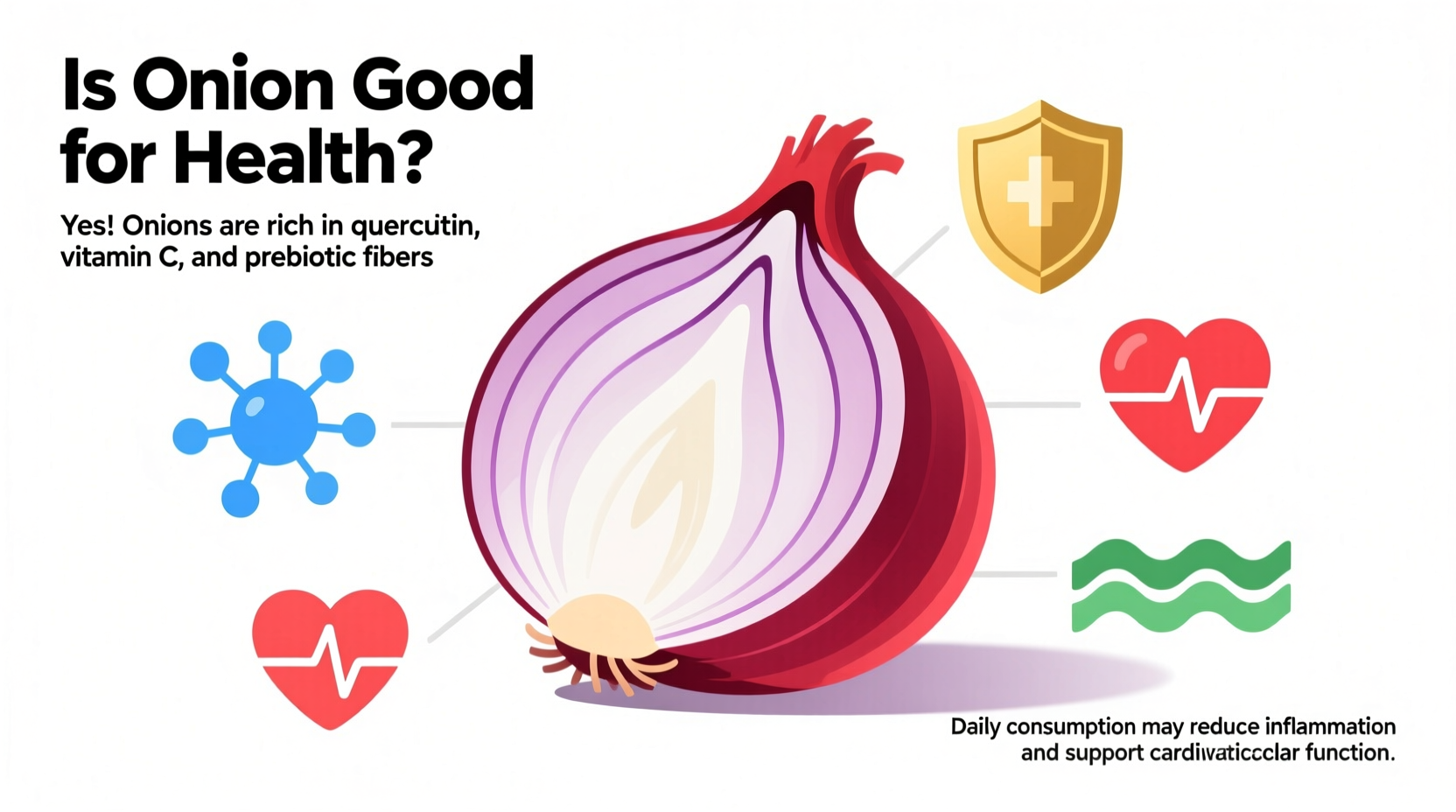For centuries, onions have been valued not just for their culinary versatility but for their remarkable health properties. Modern science now confirms what traditional medicine systems recognized long ago: onions are nutritional powerhouses with evidence-based health benefits that make them worthy of regular inclusion in your diet.
The Science Behind Onion Nutrition
Onions contain a unique combination of bioactive compounds that contribute to their health-promoting effects. According to the USDA National Nutrient Database, a medium onion (110g) provides:
| Nutrient | Amount per Medium Onion | % Daily Value |
|---|---|---|
| Calories | 44 | 2% |
| Fiber | 2.7g | 10% |
| Vitamin C | 11.8mg | 13% |
| Folate | 27mcg | 7% |
| Potassium | 234mg | 7% |
But the real health magic comes from onion's phytochemicals, particularly organosulfur compounds and flavonoids like quercetin. These compounds work synergistically to deliver multiple health benefits, as documented in research published by the National Center for Biotechnology Information.

Cardiovascular Health: Onions' Most Significant Benefit
Multiple studies confirm onions' positive impact on heart health. Research from the American Heart Association demonstrates that regular onion consumption can:
- Reduce systolic blood pressure by 5-10 mmHg in hypertensive individuals
- Lower LDL ("bad") cholesterol levels by up to 20%
- Inhibit platelet aggregation, reducing risk of blood clots
- Improve endothelial function, enhancing blood vessel flexibility
The organosulfur compounds in onions stimulate the production of nitric oxide, which helps blood vessels relax and dilate. This mechanism explains why populations with high onion consumption, like those in Mediterranean regions, show lower rates of cardiovascular disease.
Comparing Onion Varieties: Which Type Offers Maximum Benefits?
Not all onions deliver equal health benefits. The concentration of beneficial compounds varies significantly by variety:
| Onion Type | Quercetin Content (mg/100g) | Sulfur Compounds | Best For |
|---|---|---|---|
| Red Onions | 31.6 | High | Raw consumption, salads, maximum antioxidant benefit |
| Yellow Onions | 11.8 | Very High | Cooking, caramelizing, cardiovascular benefits |
| White Onions | 7.2 | Moderate | Mexican cuisine, milder flavor profile |
| Shallots | 23.5 | High | Vinaigrettes, sauces, concentrated flavor |
According to research published in the Journal of Agricultural and Food Chemistry, red onions contain up to 11 times more antioxidants than white onions. The anthocyanins that give red onions their color are powerful antioxidants associated with reduced risk of chronic diseases.
Anti-Inflammatory and Immune Support Properties
Onions' anti-inflammatory effects make them valuable for managing chronic inflammation, which underlies many modern diseases. The quercetin in onions inhibits the release of inflammatory enzymes like cyclooxygenase and lipoxygenase.
A 2020 study in Nutrients journal found that regular onion consumption significantly reduced markers of inflammation including C-reactive protein (CRP) and interleukin-6 (IL-6) in participants with metabolic syndrome.
Additionally, onions provide:
- Vitamin C to support immune cell function
- Prebiotic fiber (inulin) that feeds beneficial gut bacteria
- Antimicrobial compounds effective against various pathogens
Practical Tips for Maximizing Onion Health Benefits
To get the most health value from onions, follow these evidence-based preparation methods:
- Let cut onions sit for 10 minutes before eating or cooking to maximize allicin production
- Consume raw when possible - cooking reduces quercetin content by 20-30%
- Pair with healthy fats like olive oil to enhance absorption of fat-soluble compounds
- Include the outer layers - the layers closest to the skin contain the highest concentration of beneficial compounds
- Combine with other allium vegetables like garlic for synergistic health effects
For those concerned about onion breath, chewing fresh parsley or mint leaves after consumption can neutralize odors while adding additional antioxidants.
When Onions Might Not Be Beneficial: Context Boundaries
While onions offer numerous health benefits for most people, certain individuals should moderate their consumption:
- Irritable Bowel Syndrome (IBS) sufferers - onions contain FODMAPs that can trigger symptoms in sensitive individuals
- People with acid reflux - onions may relax the lower esophageal sphincter, worsening symptoms
- Those on blood thinners - high vitamin K content in green onion tops may interact with medications
- Individuals with onion allergies - though rare, some people experience allergic reactions
According to clinical guidelines from the National Institute of Diabetes and Digestive and Kidney Diseases, people following a low-FODMAP diet for IBS management should limit onion consumption to 10g or less per serving.
Onions and Cancer Prevention: What the Research Shows
Population studies suggest a compelling connection between onion consumption and reduced cancer risk. Research published in The Journal of Nutrition analyzed data from 26,000 participants and found:
- Those consuming onions 1-2 times weekly had 15% lower risk of colorectal cancer
- Daily consumption was associated with 22% lower risk of stomach cancer
- High onion intake correlated with 25% reduced risk of prostate cancer
The protective effects appear strongest for gastrointestinal cancers, likely due to onions' ability to inhibit Helicobacter pylori growth and reduce oxidative damage in the digestive tract.
How Much Onion Should You Eat for Health Benefits?
Research suggests consuming approximately 30-50g of onions daily (about 1/4 to 1/2 medium onion) provides measurable health benefits without causing digestive discomfort for most people. This amount delivers:
- 10-15mg of quercetin, the threshold shown to produce cardiovascular benefits
- 2-3g of prebiotic fiber to support gut health
- Significant amounts of sulfur compounds for detoxification support
For maximum benefit, distribute your onion intake throughout the week rather than consuming large amounts infrequently. Consistency matters more than single large servings when it comes to reaping the long-term health advantages.











 浙公网安备
33010002000092号
浙公网安备
33010002000092号 浙B2-20120091-4
浙B2-20120091-4